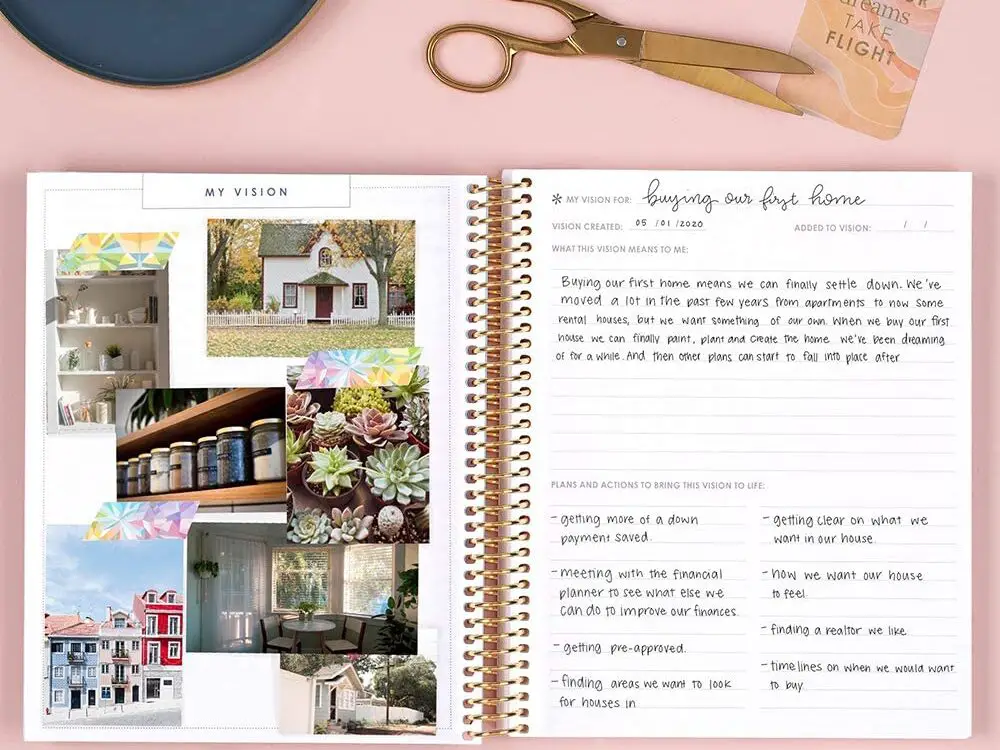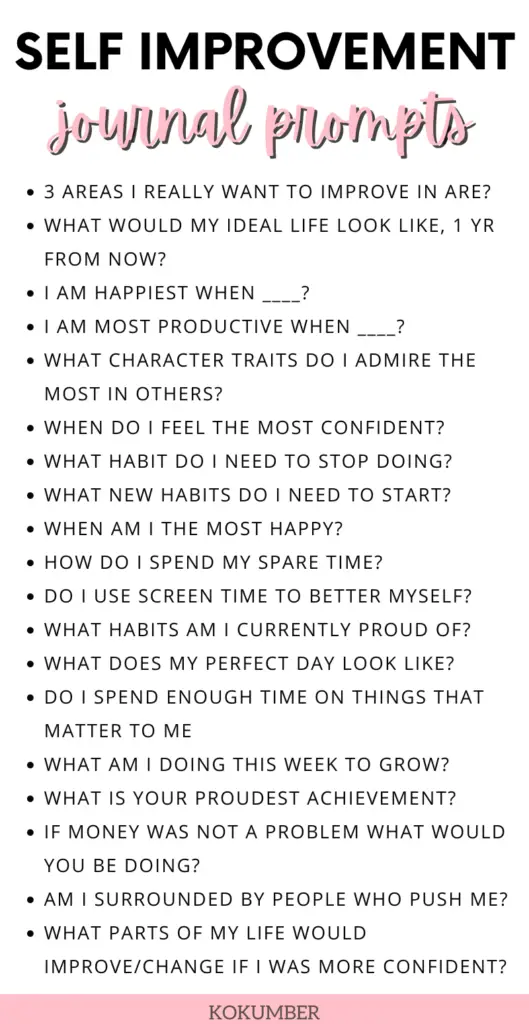This post is all about how to journal for self growth.
Disclaimer – This post may contain affiliate links, which means I’ll receive a commission if you purchase through my link, at no extra cost to you.

If you’re on a personal growth journey, journaling is literally the best thing to get started with. In a world where you’re constantly consuming information from all directions, journaling helps you sit down and actually process your thoughts.
There are very few things that you can do for self growth that’ll give you as quick results as journaling will. Mainly, because it’s so easy to get started with journaling and helps you gain mental clarity faster.
If you’ve no idea how to journal for self growth, I’m giving you the exact steps to get started today.
The worst mistake you can make as a beginner is to make journaling feel like a chore!
Now, I know that when you have a big fat to-do list, the last thing you want to do is sit down with a journal. That’s why, I’m giving you some practical tips on “how to find time to journal in an already busy life?” (I got you!)
While also resolving every newbie’s conundrum of “what the hell should I write in my journal!?”
Here’s the ultimate beginner’s guide on how to journal for self growth. Also, don’t forget to download the self improvement journal prompts at the end of the post!
how journaling helps With personal growth
1. It helps you become self aware
Because self-awareness is the first step towards self-improvement. How can you begin to improve your habits and thought patterns if you are unaware of them?
Writing down about your emotions reveals thoughts you didn’t even know existed in your head.
A daily check-in will quickly help you analyze the habits that are beneficial for you from those that are not.
Answering self discovery journal prompts will help you dive deep into your thoughts and learn more about yourself. Maybe even spot the limiting thoughts that are keeping you stuck.
Of course, it won’t happen all at once but journaling is the easiest way to hold a mirror in front of your mind.
2. it helps you set clear goals
A lot of people chase vague goals set by others, only to hit those goals and realize they never cared about them in the first place.
Learning how to journal for self growth will help you analyze the things you truly care about, can’t stop thinking about, and want to work on. If you want to get creative, try vision journaling (mentioned in a below section).
Even in terms of your personal development goals. You know, self growth can look different for different people, so before continuing just ask yourself, ‘What does self growth look like for me?’.
That alone will help you realize which areas of your life you want to improve first.
3. hold yourself accountable
Firstly, getting clear on your goals automatically increases your chances of actually achieving them. I mean, how many people know exactly what they want in life? Very few.
Also, there’s something about writing down your goals on paper that makes it more concrete.
Your goals stays at the back of your mind all the time, and you start holding yourself accountable for taking actions towards it.
4. manage your emotions
Nothing like a brain dump to ease your worries and lower your stress.
Trust me, the next time you feel overwhelmed or can’t find the solution to a problem, just start dumping your thoughts on paper.
The thing is, our brain loves to draw dramatic conclusions from minor problems. But when you write things down on paper you realize it’s not as big of a deal as you’re making it!
Also, the good old famous gratitude journaling. I mean, practicing gratitude every morning can easily improve your outlook towards life.
Related Post : How To Start A Gratitude Journal
5. it helps you check in with yourself
How many of you actually sit down at the end of day and think about “how your day went?” Probably none of us! I mean, we’d rather scroll through Instagram, right?
But a quick 10 minute check in can actually help you make the most of your days. And process what’s going on in your mind.
Looking at ‘what went well?’ will boost your confidence and writing down ‘what didn’t go as planned?’ will help you identify the gaps and actually improve the next day.
6. helps you be more intentional
When you know what matters to you, you can be more intentional about prioritizing that first. (You see how it all comes back to being self aware!)
Let’s say, connection is something you want to work on. Now that you know that you can start intentionally scheduling family time every day or call your best friend in between meetings.
7. find solutions to the problem in a way that works for you
I recently read in a book that people who practice journaling are automatically more calm and organized that people who don’t.
The reason?
Putting your thoughts on paper helps you organize them better and work through the solutions easily.
It saves you the time you’d spend on indulging in confusion and stress otherwise.
Journaling can actually help you be more creative. Because when you look at things from a calm perspective, you can actually come up with unique ideas.
how to journal for self growth
1. What is your end goal with journaling?
Here you go, your first journal prompt – ‘Why have you picked up this journal?’
Of course, your goals can change with time. But for starters, what changes do you want to see in your mental health, as you start journaling?
Do you want to use journaling as a self care practice, or become more self aware, or just organize your thoughts because you’re forever overthinking (me!)
Mind you, once you start journaling, you’ll obviously start gaining other benefits as well. But knowing your ‘why’ would save you from getting overwhelmed by all kinds of journaling ideas.
2. start small to make it a habit
Don’t try to start a 2 hour journaling routine all together. I mean, it’s great if you can have that but honestly, you won’t!
In fact, as James Clear says, ask yourself ‘what is the easiest simplest way you can start journaling today?’
Also, stack your new habits on top of the pre-existing ones.
Maybe just start with writing down 3 things you’re grateful for, on your way to work. Or journaling about how you feel right after you finish a workout, while sipping your protein shake.
Or just use the journaling printable given at the end, and answer one prompt every day before going to bed.
Make sure that journal for self growth is an easy habit.
3. consistency will get you through the tough days
As anything with self growth, you can’t see the results until you’re consistent with it.
Which is why you need to make this process as easy and fun for yourself, as possible. So that you come back to it every day.
Make it a routine that you look forward to. Create your cozy journal corner.
Like, sitting down with your morning coffee on the front porch, enjoying the silence and journaling in peace.
I usually start a journaling challenge like answering one prompt every day when trying to build a habit. It’s fun and it challenges me to keep coming back.
4. don’t judge
This is literally the GOLDEN rule of journaling.
Do not judge your thoughts.
A lot of people use this new found self awareness to put themselves down.
So, the next time you find yourself thinking a negative thought or overthinking negative thoughts, instead of judging yourself, be curious.
Curious about where did that thought come from? And, what else can you think to replace it?
If you continue to judge yourself every time you journal, you will eventually give up.
I mean, why would you want to come back to a habit that makes you feel like sh*t? I know, I won’t!
5. have a set template
This goes back to making things easy.
While there are 100 different ways to journal, chances are, on most days you won’t know what to journal about.
That’s when a template comes into play.
You don’t have to stick to it everyday. What’s the fun in that? But on days when you don’t feel like doing a brain dump or talking about something specific, turn to your journal template.
It could simply look like answering the 5-minute journal prompts, or writing down 5 things you’re grateful for. Don’t make it too complicated.

Here are 50 daily journal prompts for beginners to get started with! I try to follow these religiously (on most days haha)
6. find what works for you
The answer to how to journal for self growth isn’t specific.
There are probably a 100 ways of journaling, and each one of them works.
The real question is, what works for you?
Maybe following journal prompts is more your thing, or maybe you love the free flow.
Perhaps you’re more creative and want to try art journaling, or start a bullet journal because you want to be more productive and organized.
Below I’ve mentioned different ways to try for how to journal for self growth.
I’d say have fun with all of them. And then decide which one you enjoyed the most 😉
Gratitude journaling and check-ins are my favourites; I always get the most out of them!
How to find time to journal?
My biggest problem with journaling is that I just can’t find time to journal.
Not that I don’t have free time during the day, but it’s easier for me to spend it on my phone or while reading than sitting down to journal.
If you’re stressed about work, you’d rather make a to-do list than journal about it. Or if you’re having a bad day, it’s easier to binge Netflix and avoid your feelings.
Getting over that initial resistance can be tough.
But trust me, the minute you’d sit down to journal, you’d get the answer as to why it’s a better choice.
Journaling always leaves you feeling so much more calm, organized and ready to tackle shit.
Now, if you’re thinking how to journal for self growth and finding it hard to make time, start small.
Just start a 15 minute routine, and have a few prompts ready to use when you have nothing to write about. It’ll make your life so easy. And make it a part of your pre-existing routine.
Also, when you sit down to write, start writing about anything, to get past the initial resistance.
Just start writing down about the conversation you had with your colleague, or how you’re feeling in the moment and your thoughts will automatically flow from there.
What to write in a self improvement journal?
The biggest question when it comes to how to journal for self growth! Well, here are some fun and easy ideas to start writing about when your mind goes blank.
You can also use the self improvement journal prompts given below if you’ve no idea what to write.
1. vision journal
Basically, you just write down about your goals in a dreamy way.
Try answering these questions,
‘It’s one year from now, and you’re living your best life. What does it look like?’
‘What would your ideal day look like?’
The key is to get really specific and let yourself dream of the perfect world scenario for a while.
Writing a vision journal entry would help you get clear on your goals. And actually motivate you to start working on them.

2. check-ins
You can do a daily check-in by analyzing your days and answering, ‘What went right?’, ‘What went wrong?’ and ‘How can you improve?’.
My favorite type of check-in is the accomplishment journal. Basically, every night write down 3 things you accomplished today.
It’s important because most of us are not good at giving ourselves credit for all our accomplishments. Doing this will actually boost your confidence.
And if you’re having a bad day, you know you can always turn back to this list!
Related Post : How To Build Confidence As A Woman
3. gratitude journal
Gratitude journaling is hands down the easiest form of journaling. It’ll hardly take 5 minutes of your day and will create a long lasting impact.
Simply, write down 3 things you’re grateful for everyday. And get very specific about them.
When I started doing gratitude journaling consistently, I started noticing myself being grateful in the moment for little things during the day.
And all I did was write 3 grateful things on my way to work. That’s a win-win!
Related Post : 8 Ways To Practice Gratitude If You Find It Hard
4. daily journal prompts
Using daily journal prompts is a smart idea. You can easily make them a part of your routine, they help you stay organized and productive, and all you gotta do is answer journal prompts.
Here are 50 simple daily journal prompts to pick and choose from everyday.
You also can try doing morning pages; simply writing everything inside your head every morning.
Or set daily intentions before starting your day. Or do a daily check-in at night.
5. thought dumps
Thought dumps are the best thing to do every time you feel overwhelmed or stressed out.
If you have a lot on your plate, writing it all down will help.
If you’re feeling down about something, dump your thoughts to help you work through your feelings.
Doing a brain dump will always leave you feeling lighter and more calm.
Related Post : How To Do A Brain Dump To Declutter Your Mind
6. guided journal
If you have absolutely no idea what to write, or want to pick a fun prompt for the day, guided journaling is the way to go.
There are tons of guided journal prompts , from self love, to mindfulness, to prompts for stress release, depending on what you want at the minute.
If you’re looking how to journal for self growth, here are 20+ self improvement journal prompts to start with!
self improvement journal prompts

Related Post
1) Mindfulness Journal Prompts For Adults
2) 30 Journal Prompts To Deal With Stress
3) How To Start Journaling For Real






